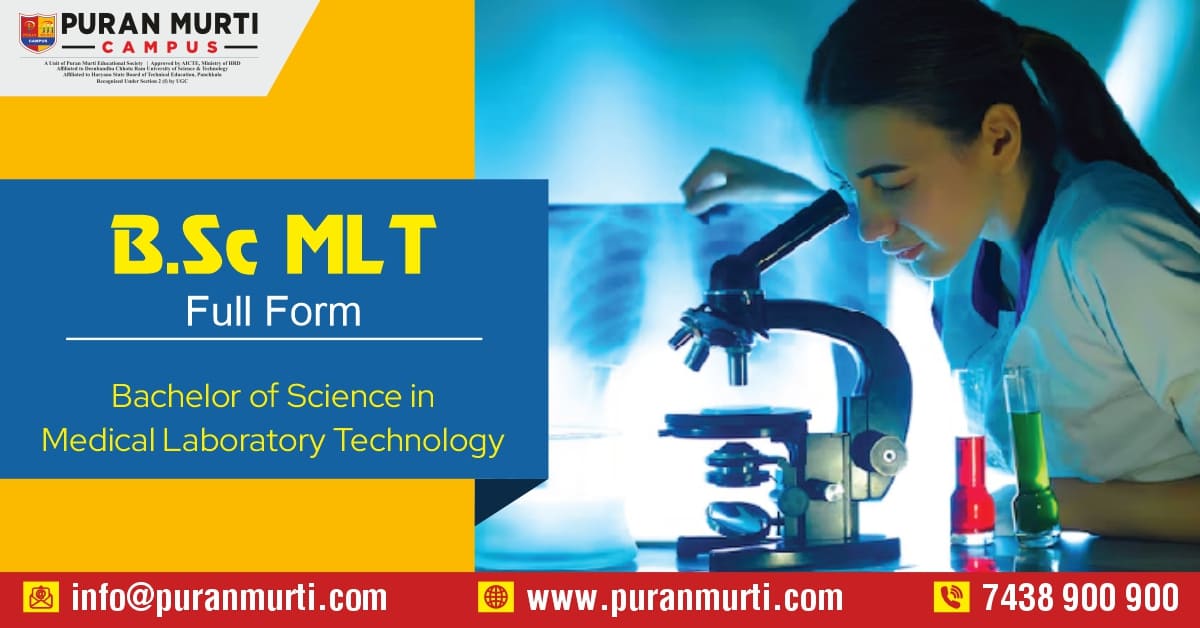
BSc MLT Full Form: Bachelor of Science in Medical Laboratory Technology is a 3 to 4-year undergraduate program that focuses on a crucial part of healthcare which is diagnosis, treatment, and prevention of diseases with the help of laboratory tests and medical research. The course builds a foundation where skills required for carrying out biological sample analysis, diagnostic test explanation, and medical reporting are taught practically and theoretically. With the ever-expanding healthcare sector, competent medical laboratory technologists are now required in cases in hospitals, diagnostic theaters, and research laboratories.
What is BSc MLT?
BSc MLT is a three to four years degree program that trains students to become specialized medical diagnostic and laboratory testing practitioners. It prepares the learners to undertake specialist clinical tests, analyses biological specimens, and aid on medical studies. The program includes practicality on the following subjects: biochemistry, microbiology, pathology, hematology, and immunology.
Countries around the globe with a sustaining increase in healthcare services and activities have ample BSc MLT openings in government and private organizations.
Course Structure for BSc MLT
1. Duration
- Typically 3 to 4 years, depending on the university and country.
- Some institutions include an additional internship of 6 months to 1 year for practical training in medical labs.
2. Eligibility Criteria
- Education: 10+2 (Higher Secondary) with Physics, Chemistry, and Biology.
- Minimum Marks: 45% - 60% aggregate (varies by institution).
- Some universities may accept students with vocational or paramedical backgrounds.
BSc MLT Syllabus
| Year | Semester | Subjects |
|---|---|---|
| 1st Year | Semester 1 | Human Anatomy and Physiology |
| Understanding body functions | ||
| Semester 2 | Clinical Biochemistry | |
| Study of metabolic disorders | ||
| 2nd Year | Semester 3 | Microbiology |
| Parasitology | ||
| Study of infections | ||
| Semester 4 | Hematology | |
| Blood Banking | ||
| Blood disorders and transfusion procedures | ||
| 3rd Year | Semester 5 | Histopathology or Cytology |
| Disease diagnosis through tissue and cell examination | ||
| Semester 6 | Immunology | |
| Serology | ||
| Study of immune response and Medical Ethics or Laboratory Management |
Career Opportunities in BSc MLT
| Job Roles | Industry Sectors |
|---|---|
| Medical Laboratory Technician (MLT) | Hospitals (Government and Private), Diagnostic Labs |
| Medical Technologist | Pathology and Research Laboratories |
| Research Assistant | Pharmaceutical Companies, Clinical Research Labs |
| Pathology Technician | Hospitals and Pathology Centers |
| Cytotechnologist | Diagnostic and Research Labs |
| Blood Bank Technician | Blood Banks and Transplant Units |
| Lab Manager and Supervisor | Hospitals, Diagnostic Centers, Research Labs |
| Public Health Specialist | Public Health Organizations, Community Health Programs |
| Lecturer / Laboratory Instructor | Academic and Teaching Institutions |
BSc MLT Salary in India
| Sector / Experience Level | Monthly Salary (INR) | Annual Salary (INR) |
|---|---|---|
| Private Hospitals and Diagnostic Labs | INR 15,000 - INR 50,000 | INR 1.8 LPA - INR 6 LPA |
| Government Hospitals and Research Institutes | INR 30,000 - INR 80,000 | INR 3.6 LPA - INR 10 LPA |
| Pharmaceutical and Research Companies | INR 40,000 - INR 1,00,000 | INR 6 LPA - INR 12 LPA |
| Blood Banks and Pathology Labs | INR 25,000 - INR 60,000 | INR 3 LPA - INR 7.2 LPA |
| Teaching and Academic Institutions | INR 30,000 - INR 70,000 | INR 3.6 LPA - INR 8.4 LPA |
| Senior Level and Lab Managers | INR 60,000 - INR 1,50,000 | INR 8 LPA - INR 18 LPA |
Conclusion
Students who are interested in diagnostic medicine can benefit greatly from completing a Bachelor of Science in Medical Laboratory Technology. The BSc MLT is a career-focused course that trains students to be competent in disease diagnosis, laboratory work, and medical research. There are great employment opportunities for BSc MLT graduates in hospitals, diagnostic laboratories, pharmaceutical industries, and research centers due to the growing demand for healthcare professionals. The students work in a classroom and a laboratory which means that they get the both the theoretical and practical parts of the course. Because of this, the graduates can work in various areas of medicine. Furthermore, the strong earning potential and career advancement opportunities makes choosing BSC MLT an enticing decision for students who want to work in the healthcare and diagnostics field.